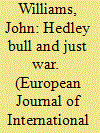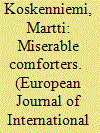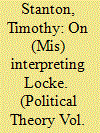|
|
|
Sort Order |
|
|
|
Items / Page
|
|
|
|
|
|
|
| Srl | Item |
| 1 |
ID:
062808


|
|
|
|
|
| Edition |
2nd ed
|
| Publication |
London, Frank Cass and Company, 1969.
|
| Description |
xvi, 226p.
|
|
|
|
|
|
|
|
|
|
|
|
Copies: C:1/I:0,R:0,Q:0
Circulation
| Accession# | Call# | Current Location | Status | Policy | Location |
| 004823 | 320.01/HOB 004823 | Main | On Shelf | General | |
|
|
|
|
| 2 |
ID:
081739


|
|
|
|
|
| Publication |
2008.
|
| Summary/Abstract |
Three controversial concepts are central to discussion on how international order originates, how it operates, and ultimately how we should respect it: globalization, empire and natural law. Each of these is examined in turn in this article. The currently prevalent way of thinking about globalization simply as a system of inter-connections, of processes and networks that span national and cultural boundaries is likely to produce anti-globalization backlashes. Many people reach the conclusion that global rules are simply a euphemism for some sort of imperial or neo-imperial rule. Consequently, there is an increasingly intense discussion of the role of force and power in a global order. This article suggests an alternative mechanism for creating global order. The power of globalization rests not simply on material prosperity, but on the ability to communicate and share ideas as well as goods across large geographical and cultural distances. Natural law theories suggest that a sustained dialogue between apparently rival traditions of thinking can lead to agreement on shared norms and values.
|
|
|
|
|
|
|
|
|
|
|
|
|
|
|
|
| 3 |
ID:
097731


|
|
|
|
|
| Publication |
2010.
|
| Summary/Abstract |
This article explores the reasons for the absence of a systematic engagement with the tradition of Just War in the political theory of Hedley Bull, despite his recognition of war as a key institution of international society and his engagement with normative aspects of International Relations and the thought of Hugo Grotius, a key figure in the Just War tradition. Developing work arguing for Bull's highly problematic reading of Grotius, the article considers the impact of philosophical and methodological aspects of Bull's work to explain his rejection of Just War and to argue that this rejection is neither plausible nor beneficial to Bull's engagement with war as an institution. Additionally, the article considers the potential for and benefits of engagement between English School theory and the Just War tradition for efforts within the English School to more effectively establish its normative dimension.
|
|
|
|
|
|
|
|
|
|
|
|
|
|
|
|
| 4 |
ID:
091914


|
|
|
|
|
| Publication |
2009.
|
| Summary/Abstract |
In his 'Perpetual Peace', Kant indicts the natural law tradition (Grotius, Pufendorf, Vattel) as 'miserable comforters' whose principles and doctrines 'cannot have the slightest legal force'. The indictment emerges from Kant's critique of natural law in both its empirical and rationalist variants as unable to uphold a really 'binding' notion of cosmopolitan legality. Since the early 1990s a new literature has emerged in the International Relations field that speaks about the effectiveness and legitimacy of international law as a form of supranational 'governance'. This article argues that that literature raises precisely the same problems that Kant detected in early modern natural law. Like the latter, this literature is best seen as an attempt to appropriate the voice of international legality to a fully instrumentalist discipline dedicated to serving the interests of power
|
|
|
|
|
|
|
|
|
|
|
|
|
|
|
|
| 5 |
ID:
112369


|
|
|
| 6 |
ID:
105656


|
|
|
|
|
| Publication |
2011.
|
| Summary/Abstract |
This article explores the account of international hospitality found in the natural law tradition from Vitoria to Kant. Rather than limit itself to intellectual history, the focus here is on a more enduring theme: the double-bind of hospitality which the natural lawyers encountered in seeking to find a place for the welcome of the foreigner in the 'law of nations'. Although these thinkers agreed on a natural right of communication, this proved destabilising, even destructive, of the property claims by which hosts establish their domain as properly theirs in the first place. All struggled with this double-bind, though this took different forms, from the concern that the law of hospitality might thereby justify colonial appropriation to fears for how it could threaten sovereignty. Two thinkers arguably find a way out of the double-bind of right of communication-right of property in hospitality, but sacrifice the law of hospitality in the process: Pufendorf, subordinating communication to property, turns hospitality into charity and thereby effectively denies it status as a law of nature; Kant, putting communication first, makes hospitality a matter of right, not philanthropy, but also sees it as instrumental to the development of a global civil condition, where it would be redundant.
|
|
|
|
|
|
|
|
|
|
|
|
|
|
|
|
|
|
|
|
|